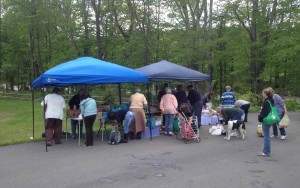Thank You for Bringing HOPE

Thank you for your support throughout the year and for the holidays.
I’m hoping that you can continue to include your “feeding the hungry” activities throughout the coming year! Your donations translate into hot meals, safe shelter, and a reminder to the hungry and unhoused that there are those out there who care.
Your generosity changes lives. Food pantries, soup kitchens, and shelters restore people’s lives.
It takes all of us to support those in need.
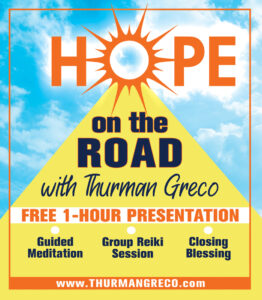

Do you have a crowded closet? Winter clothing needs include:
warm coats
foot wear – especially boots
warm gloves and hats
jeans and pants
sweatpants
long underwear
The items most often resquested: socks
– – – – – – – – –
Thanks for reading this blog post. Please share it on your preferred social media network. Forward it to your friends and relatives.
Find more information about hunger and homelessness on “Let’s Live with Thurman Greco” on YOUTUBE.
www.thurmangreco.com
www.hungerisnotadisease.com
THANK YOU FOR CARING!

Do you want to learn more about hunger and homelessness in America? You can find more info in previous posts on this blog.
New Beginnings – Part 2 as I Explore the Spirituality of Hunger in America

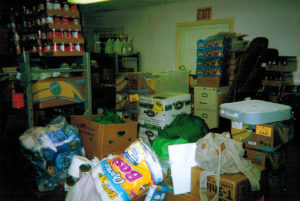
Like many first-time pantry volunteers everywhere, I showed up that morning because someone from the church asked me to come. A slot needed to be filled and I stepped up to the plate when I was asked. I was a foot soldier in the army of the outreach. I tried to live up to my status in the church as a new member. I showed up at whatever activity needed help and did my share. Nothing more.
I had no desire to move up any ladder in the congregation.
On that morning of new beginnings, I had no premonition I would ever return to this pantry room.
I had no plans for this place in my future. I had a profession teaching reflexology, Reiki, and canine massage therapy in a healing space in my home on Tannery Brook.
This was a case of fools rushing. Knowing what I know now, I should have run out the door and never looked back. Mary could have handled the crowd that day without me. In the whole two hours, no more than a couple dozen people visited the pantry.
I wasn’t blessed with any psychic knowledge…certainly not the feeling of danger I felt when I saw the head of the building committee in the hallway outside the pantry months later.
There were no lines in the hallway at the new beginnings of my time there. People wandered into the pantry in groups of one and two to choose from cereal, soup, tuna, and peanut butter.
Never in my wildest thoughts on that day did I envision the pantry hallway filled with hungry people, the tiny room packed with fresh produce and jammed with shoppers.
By 2008, the tanked economy was well underway and waits in the hallway were an hour or more.
The Hunger Prevention Nutrition Assistance Program (HPNAP) passed down feeding guidelines which included whole-grain bread, 1% milk, fresh produce. By 2011, the building committee had rules dictating where people could stand, what bathroom they could use, and what parts of the hallway were off-bounds.
Never did I foresee monthly food deliveries averaging over 12,000 pounds.
Never did I imagine, on that day, building committee members angry over hungry people receiving food according to guidelines set down by the State of New York, the Department of Health, and the United States Department of Agriculture.
I never thought I would spend months grappling with the unworthy hungry, a concept introduced to me by a local religious leader. The concept wasn’t explained. Only the two words – unworthy hungry – were used in a sentence: “You are feeding the unworthy hungry.” This was something I never heard of before. What did she mean? Who were the unworthy hungry?
After that first morning in the food pantry, I drove home, pulled out a little notebook from a drawer and wrote what people said, like real writers do. When I wrote these things down, I felt my grandmother’s presence.
Her spirit was with me in the room. I looked around the dining area to see if someone had entered the room without my realizing it. But, no, I didn’t find a soul. I walked over to a cabinet and began my dialogue journal on that afternoon.
A shopper: “They cut my food stamps again. I don’t know how I’m going to make it. I have no money this month. My car died and I don’t know where I’m going to get money to fix it. If I can’t fix it, I can’t buy a new one either.”
Lillie Dale Cox Thurman spoke to me clearly that morning with emphatic, strong, direct instructions. She went straight to my head: “Write this down! Write this down too! Now…write this down.”
My grandmother, Lillie Dale Cox Thurman, stepped into my life on the first morning in the food pantry and never left. Not even when my mother, Uralee Thurman Lawrence, roared in with prayers and fast, furious, aggressive instructions which I resisted to the bitter end. Under their directions, I joined the crowd in the basement and was soon volunteering regularly.
So, now, I’ve got the second volume, “The Ketchup Sandwich Chronicles,” coming out on this blog.
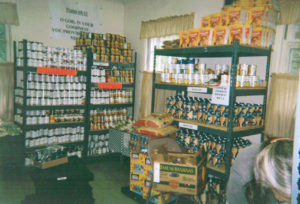
Thank you for reading this blogged book! Please refer it to your preferred social media network and stay tuned for future chapters!
Thurman Greco

Motel 19
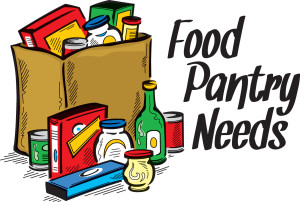
Everyone coming to a pantry travels down a path. For many, this journey is a real load lightener. As the finances erode, the house goes. And, of course, when the house goes, everything that was in it goes too.
Furniture, kitchen stuff, toys, clothes, tools, garden implements. By the time a person or family gets to Motel 19, things have slimmed down to a few clothes, a blanket or two, a hot plate, or maybe an electric skillet or microwave.
For the families living in Model 19, the children are usually eligible for the school breakfast and/or lunch program. But, that doesn’t cover eating at home. And, there’s no lunch program for the adults.
So…it’s off to the pantry.
Several families usually pile in a car and come over for an afternoon of pantry shopping. Or, an individual hitch hikes. In order for this trip to succeed, several guidelines to follow will help:
Try to arrive an hour or so before the pantry opens. This makes for a long wait but there’s more of a selection right when the pantry opens. Also, while waiting in line, there’s an opportunity to make new friends and learn a few survival skills if you’re new to the pantry experience.
Bring your own shopping bags. Some pantries don’t have enough of these much needed items.
Bring some ID. Some pantries require much: picture ID, proof of address, proof that other household members exist. This can be a bit tough if you’re homeless. Hint: some pantries require little to no identification
Be prepared to wait in a line. Use this time to meet your line neighbors. They can be helpful if you’re trying to navigate your way through DSS, if you’re being foreclosed upon, need your car repaired, etc.
As you wait in line, try to learn how the pantry works from those around you in the line. You’ll want to know how long you’ll be in the shopping room, what foods are usually on the shelves, what other pantries the people in line shop at, etc.
Don’t be afraid to let people know you’ve never been to a pantry.
Once you find a pantry you can use, go every time you’re allowed. If you’re lucky, you’ll have a pantry in your area which will allow weekly visits. Because pantry shopping takes so much time, shoppers sometimes just don’t go if they still have SNAP card money or if they have a few bucks left over from a paycheck. Your best bet is to go every week.
Why? Most pantries have different food every week and you may miss out on some real savings by not attending regularly.
Pantry shopping requires a totally new approach to cooking. So does cooking with only an electric skillet or microwave.
Some pantries have periodic visits from a nutritionist. Don’t be shy about asking him/her for any tips you might need to help this adjustment a bit easier for you. Nutritionists know a lot about the food you are now trying to cook with and they can answer any questions you might have.
Thanks for reading this blog post.
Please share this article with your favorite social media network.

PS: This book is at the publisher’s now. It will be available SOON! You can order it at http://www.thurmangreco.com.
Thanks,
Thurman Greco
SNAP
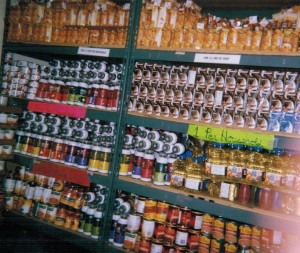 SNAP is important. SNAP will help you if you are having trouble buying groceries.
SNAP is important. SNAP will help you if you are having trouble buying groceries.
SNAP is important for your community, too, because when you are able to get food with SNAP, you will have cash available to help pay your rent or buy gas to get back and forth to work.
Have you, or has someone you know, applied for SNAP? SNAP was formerly known as food stamps.. SNAP is about all that’s left in the way of assistance for people because welfare is shrinking and shrinking and shrinking yet again.
If you are having trouble paying for your groceries, now is a good time to apply. If you’ve applied in the past and were denied, maybe you need to apply again. You may, after all, have answered a question incompletely or incorrectly and were denied this benefit. Try again. You might do better this time around, especially if you or someone in your house is disabled or is a senior with medical expenses.
Some people are reluctant to apply for SNAP because they don’t know if they are eligible. Or, maybe they applied in the past but were denied. Many people don’t know how to apply and are overwhelmed by the application. Some people have never heard of SNAP and think of it as food stamps.
One thing: If you work, you need to know how to meet the work requirements.
Some information is needed to successfully apply for SNAP. This information comes in several categories.
Proof of income is necessary. This comes in the form of pay stubs, social security income information.
An identification is needed. This might be a State ID, passport, birth certificate, etc.
Bills help. This will include medical, heating, water, auto, rent.
Your social security number and the numbers of everyone in your household is necessary.
Dependent Care Costs will help. These include day care costs, child support, attendant for disabled adult.
Contact your local Department of Social Services office to arrange for application assistance. If this doesn’t work for you, contact your Office on Aging or Catholic Charities.
SNAP is an important benefit which will help you if you are having trouble buying groceries.
SNAP is important for your community, too, because when you are able to get food with stamps, you will have cash available to help pay your rent or buy gas to get back and forth to work.
SNAP is important for your household because you’ll be able to get more food with your SNAP card and you won’t be hungry anymore.
This translates to better health.
Thank you for reading this blog post.
Please share this article with your preferred social media network.
Please forward this article to anyone and everyone you know who might be able to have a better life with SNAP.
Thurman Greco
 This book is being published now and will be available soon!
This book is being published now and will be available soon!
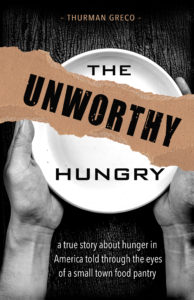 This book will be going to the publisher before the end of the year.
This book will be going to the publisher before the end of the year.
Awaken The Connection
PANTRIES CAN BE POWERFUL PLACES. Everyone coming to a pantry needs healing of one kind or another. People come to pantries for just that healing.
The Reservoir Food Pantry offers an opportunity for all of us to find a place of connection and wholeness within ourselves.
This connections makes us aware that what we think and do matters, that our feelings and intentions are important, and that we are not alone or separate. We are not above or below others.
THESE REALIZATIONS CAN BE INCREDIBLY POWERFUL. Once we become more aware, we feel more responsible for our inner growth and for all life around us.
Feeding people and allowing others to feed us makes us know that we are all one huge family on this planet. Knowing this concept can wake up the world.
JOIN US. Work in the pantry, shop in the pantry. Participation in the pantry will allow you to experience deeply your connection to all living beings.
YOUR COMMITMENT TO A PANTRY WILL ALLOW YOU TO JOURNEY DOWN A PATH WHERE WE CAN ALL BE ONE AND DEEPER COMMUNICATION IS A REALITY.
Thank you for reading this blog/book.
Please share this article with your preferred social network.
Please leave a comment.
Don’t forget to join the email list.
Peace and food for all.
Thurman Greco
Do you work at a pantry? Do you shop at a pantry? Do you donate to a pantry? – Part 2
“Can I offer you some of this delicious celery? I noticed you just walked past it.”
“THANKS, BUT I CAN’T CHEW IT. I WISH I COULD.
A big challenge in the food pantry system is getting the food to the people that they can eat. Many things come into play here:
Dietary preferences
Health conditions
Religious guidelines
One challenge hardly ever mentioned is whether or not a person has teeth.
Once the teeth are gone, many foods are just not edible for a person. Take for example a simple food like bread. Our pantry has always been proud to serve Bread Alone Bread. Unfortunately, toothless people have trouble eating it. It’s not soft enough.
There are many fruits and vegetables which a toothless person cannot eat:
celery
radishes
apples
Pantries offering client choice make life easier for both the pantry and the shopper because people take what they can use.
Another consideration in choosing food for pantry shelves is the homeless person. The homeless person’s kitchen is in his/her shirt pocket so the selection is limited to
peanut butter
protein bars
cheese
carrot sticks.
Foods for the homeless include items
which can be eaten raw,
which don’t need either refrigeration or cooking,
which can be easily carried from place to place.
Once a person becomes homeless, s/he more or less automatically becomes hungry. For many homeless, eating is a challenge repeated at every meal. Some food pantries knowingly or unknowingly are not homeless friendly because
of the bureaucracy of the paperwork (How does one prove which bridge s/he lives under?),
of the lack of foods on the shelves acceptable to the homeless,
and because pantry coordinators, church boards, feel that food pantries are inappropriate for homeless people.
Whenever I ponder the obstacles to offering proper food to pantry shoppers, I find myself asking questions:
Why can’t:
food stamps be more generous?
wages be higher?
gas be cheaper?
rent be realistic?
Thank you for reading this blog/book.
Beginning with the next post, this blog’s articles will be published on Tuesdays and Thursdays. Please let me know how this new publishing format works for you.
Please refer this article to your preferred social media network.
Don’t forget to join the email list.
Please send a comment.
Peace and food for all.
Thurman Greco
Don’t go Away. I need to talk to you.
“WE ALL KNOW ANGER. We also know how it kills our inner peace. And while most of us like the idea of forgiveness, it often seems a difficult thing to practice, especially when the source of our hurt is up close and personal.” – Mike George
“Don’t go away. I need to talk to you” the man aid in an authoritative voice as he walked toward me in the basement hallway of the Woodstock Reformed Church.
As I heard his voice, the hair on my neck began to stand up. I had just walked out of the pantry room for a moment. Stocking shelves in the pantry, I was preparing for the hungry who would be shopping soon. I’d been putting USDA canned green beans on the third shelf down from the top of a unit by a window.
“GOOD AFTERNOON, SIR. What can I do for you?”
“Well, for starters you can stop feeding all those people. Ever since you started working here, more and more people are standing in our halls. You’re feeding the unworthy hungry and I want it to stop. Right. Now.” he said with emphasis.
The man standing over me in the hall was fat, old, angry. His toes pointed outward…a sure sign to me he suffered from a backache. “I’m Ed Jabbs. I’m head of the building committee for this church and I want to see your files on the people who use this pantry.”
“I’m sorry sir. We don’t keep many files on our shoppers. We keep a journal where we record their names and number of people in each household. That’s all.”
WE’RE A PANTRY, NOT THE POLICE, I THOUGHT TO MYSELF.
“Well, you should. No one should be allowed in the pantry who isn’t on food stamps. You’re feeding people who shouldn’t be coming here to get this food. You’re feeding the unworthy hungry.”
“Just last week you gave food to a man who I know shouldn’t be fed. He’s a writer. He published a book a couple of years ago and he shouldn’t even be here. Writers make a lot of money. ”
I’d heard about Ed Jabbs. He was a story in Woodstock. He was head of the building committee, was not a pantry supporter, and was definitely not a Thurman Greco supporter. After all, I reported to the Food Bank, not him. “This man is definitely a threat to the pantry” was the thought going through my mind as he stood over me.
Forever a mystery, I had heard gossip: Some church members were afraid of him. He had once belonged to a church in Saugerties but left after some event when a few members there had had enough. He was reputed to drive an expensive car with Delaware plates, and lived in Saugerties.
Not a secret: He very definitely did not like the way the pantry in the church was being managed now.
And, he had grounds. Before 2008, the pantry served about 25 colorful characters on Thursday mornings and now with the economy in the tank, new hungry people showed up every week. Lines were getting longer and longer.
The Hunger Prevention Nutrition Assistance Program changed our nutritional guidelines to include fresh produce, 1% milk, and whole grain breads. Before the guidelines changed, shoppers got a jar of peanut butter, a box of cereal, a can of tuna fish and maybe a can of soup. Now, they received a 3-day-supply of food for everyone in the household. Fresh produce lined the walls of the pantry. Bread Alone sent over bread weekly and pet food was even available.
These changes brought not only hungry people but mountains of cardboard and, according to some church people, vermin. Some felt we were being overrun with vermin. No amount of reasoning convinced them of anything different. It didn’t matter one whit that there was not even one bug or mouse to be found in the pantry.
Meanwhile, here was this angry man staring at me and demanding to see files the State didn’t even require.
“Well, Mr. Jabbs, I can call the Food Bank and find out what files we need. However, the inspector was here only a few weeks ago, looked at all my paperwork and pronounced everything “excellent”. We’ve never done anything like this before. After all, we’re a food pantry…not the police.”
“Check into it NOW”! he said as he turned away, his toes still pointing outward. Mr. Jabbs turned and smiled at me then, displaying a mouthful of large yellow teeth.
Thank you for reading this blog/book.
Please refer this article to your preferred social media network.
Please send a comment.
Don’t forget to join my mailing list.
Peace and food for all.
Thurman Greco
Think Globally – Act Locally at the Food Pantry
“It doesn’t solve the problem” she said. “We should be solving the problem.”
WE WERE STANDING IN THE HALLWAY OF THE PANTRY. Hungry people jammed the place. Even with the heat turned off, it was warm, just from the body heat of the crowd. Someone had invited her over in hopes she’d see the people and be motivated to write a generous check to the pantry.
THE WHOLE SCHEME BACKFIRED. “There was an ad in the paper on Sunday” she said. “These people should all be out applying for jobs.”
Yeah. Right. We’ll all line up and apply for the job you saw listed, I thought. Besides that, many of these people have jobs. Some of them have more than one job.
“Well, I can see your point,” I replied. Certainly, on some levels, a pantry does not solve the problem. However, there are many problems to be solved when we talk hunger. “Pantries do solve some of the problems.”
Take, for example, the problem of food waste and landfills.
We need to all understand where the food fed to people in pantries, soup kitchens, and shelters comes from. It’s mostly diverted from the landfill. This diversion can reduce the waste stream, thus saving much money on local, state, and national levels. Currently, the amount of food discarded annually amounts to hundreds of billions of dollars according to the recent Feeding America survey.
FOOD SERVED IN OUR PANTRY IS DONATED FROM GROCERY STORES, FARMS, FOOD MANUFACTURERS. It’s delicious, nutritious, beautiful, mostly organic produce which should never have gone to the landfill to begin with.
For the most part, pantry and soup kitchen workers are volunteers doing a necessary job for no money. This is our tax dollars at work.
THE FOOD IS AVAILABLE. The people are hungry. When people shop at a pantry, they may save money which they can later circulate in the community.
Even though many elected officials are very much against SNAP, the funds spent with this program go directly into the community. This is a financial boost that every town, hamlet, and city can use.
WE ARE A NATION WITH FEW PUBLIC TRANSPORTATION OPTIONS. Our country’s oil industry has powerful lobbyists who leverage enough influence so their clients pay no taxes.
To feed the poor of our nation with surplus food offers them the opportunity to put more gas in their cars and get to more of the low-wage jobs they hold down. The trend is toward a person working 2 or 3 jobs. If we are too rough on the poverty stricken struggling people, they won’t be able to get to their jobs and then where will we all be?
We need more pantries to make more food more available. We need pantries in schools, churches, synagogues, town halls, hospitals, anywhere people congregate.
WE WANT TO AVOID HAVING PEOPLE DYING OF HUNGER.
Peace and food for all.
Thank you for reading this blog/book.
Please refer this article to your preferred social network.
Please send a comment.
Don’t forget to join my mailing list.
Thurman Greco
I Need a Gun in the Food Pantry
“There is nothing that can’t be solved by the use of high explosives.” – Joshua Garner
“I’d like to get an application for a gun permit, please.” I said, the only little old gray haired lady in the room. I was finally first in line at the government office at Golden Hill in Kingston.
The counter person, an overweight man in his 50’s, could hardly contain his laughter as he handed me the form. “That’ll be $5 please, miss.”
I handed him the money and started to walk away. Then, I just couldn’t stand it anymore. I turned around to him and said pleasantly “Will you sell me 3 more applications, please? I forgot the girls in my Senior Yoga class asked me to get applications for them, too.”
I pulled out $15 more and put the money on the counter. The man gave me three more applications and then I walked away. I had no idea who I was going to give the applications to but I remembered the old “Alices Restaurant” song about three people or more people doing something and being a movement.
When I got home in Woodstock, Barry was sitting on the sofa surrounded by his cats as he read the latest thriller. “Hi Thurman. How’re you doing?” he asked without looking up as he took a few grapes from a large fruit filled bowl on a table beside the sofa. .
“I WANT TO LEARN TO SHOOT A GUN. I want a gun.” I replied. “I got the application today and I want you to teach me to shoot a gun.”
“What!?”
“I want you to teach me to shoot a gun. I know you can. You didn’t spend all those years sneaking off to the CIA and NSA without knowing how to use a gun. They even gave you a medal or award or something at the CIA once. For all I know, you’re a damn bazooka expert. Maybe I want to learn that too.”
“YOU CAN’T DO THAT! You might accidentally shoot one of the Chihuahuas.”
“Well, I’m tired of asking pantry volunteers to be bodyguards. It’s not safe when I’m working in the pantry after hours. I haven’t felt safe since that incident with Mike and Mike and the air conditioner. And, I’m not one bit afraid of the shoppers.”
“Listen, I know your job is difficuIt Thurman. Not even a Marine drill sergeant would do what you’re doing. But I don’t know about a gun.”
“I know, I know. I should be more comfortable with everything that’s happening. After all, I did live fifty miles from headhunters in Venezuela but that was all a long time ago. This is the 21st century. That Maglite I bought a while back just isn’t the same as a club. I need something more powerful.
“I’ve lived with guns my whole life.” I continued. “My father wore a pistol every day to work in his law office. Everyone in my family carried guns and had rifles in their cars. My grandmother kept a rifle in her bathroom.”
” TG-YOU’RE JUST NOT THE GUN TYPE. I don’t care what you say about your relatives carrying arms. Besides that, I sold my last gun years ago. What about a knife? Let me teach you to use a knife. A good knife will cost much less and you won’t need a permit. You won’t need bullets. It won’t require maintenance. It’ll be easier to carry and use. I’ll give you lessons. Nobody will ever know. Leash up the Chihuahuas. We’re going to Warren Cutlery right now.”
And, so he did. He took me to Warren Cutlery. I held several different knives to see how they fit in my palm. My first choice didn’t pass muster. “That knife is too big and too heavy” Barry said as he pointed to a smaller model. “You need something small enough that you can open quickly. If you’re too slow, your attacker will have you down before you get it open.”
So, I chose a smaller, lighter model that happened to be on sale.
And, off we went. He taught me to use and carry a knife. He taught me how to open it quickly but never bothered with teaching me to close it fast. “That part’s not important” he said as he helped me practice.
And, he was right. A knife is quiet. It weighs less than a gun. I don’t need a permit. I don’t have to worry about shooting one of the Chihuahuas by accident. And, unless I go through a metal detector before I take it out of my purse, no one has a clue. I’m just a sweet little old gray haired lady in a Prius tootling down the road 5 miles below the speed limit.
Before it was all over, he bought me a second knife…a smaller one which I kept open on the counter in the pantry ostensibly to open cardboard boxes.
Thanks for reading this blog/book.
Please share this article with your preferred social media network.
Please send a comment.
Peace and food for all.
Thurman
School Days Are Here Again! – feeding the hungry
NEVER IN MY WILDEST DREAMS DID I EVER THINK I WOULD WRITE THIS BLOG POST. NEVER.
Hunger is a condition. It accompanies malnourishment. As Mark Bittman of the New York Times said: “Hunger can lead to starvation; starvation to death.“
School supplies, school clothes, shoes, coats, sweaters, lunches, snacks.
WHERE ARE ALL THESE THINGS TO COME FROM FOR THE HOUSEHOLD WHERE THE ONLY THING IN ABUNDANCE IS THE INSIDE OF AN EMPTY REFRIGERATOR?
Nationwide, 17 million children go to bed at night hungry. In many of these households, parents and older siblings go hungry so the younger ones can eat.
FOOD INSECURE SCHOOL CHILDREN HAVE A MUCH HARDER TIME LEARNING THAN THEIR WELL FED CLASSMATES. Statistics from the Feeding America survey tell us that one child in five eats only as school. Food Banks try to fill this gap by offering backpack programs in tandem with Food Pantries and Elementary Schools. Lucky is the child leaving school Friday afternoons with a backpack filled with nourishing food to eat over the weekend.
There are few to no Backpack Programs in our area so the volunteers at the Reservoir Food Pantry work overtime to secure enough food for families with school children.
Only 2 weeks ago pantry volunteers were outside the Kingston Walmart for three days soliciting peanut butter and jelly for school sandwiches. These volunteers will return on September 4th, 5th, and 6th to ask for food for school lunches.
On Saturday, September 27th, we’ll be outside the Boiceville IGA asking for food for school children also.
If you can drop by either of these places with a donation, we’ll be extremely grateful. If you can’t make it and want to send a donation, please send it to Reservoir Food Pantry, P.O.Box 245, Boiceville, NY 12412. Either way: dropping by the store or sending a check, we’re grateful. The food will be used to feed hungry children.
CHILDREN LEARN BETTER WHEN THEY RECEIVE NEEDED NUTRITIOUS FOOD.
Thank you for reading this blog/book.
Please post this article in your preferred social media network.
Please post a comment.
Don’t forget to join my mailing list.
Peace and food for all.
Thurman Greco

